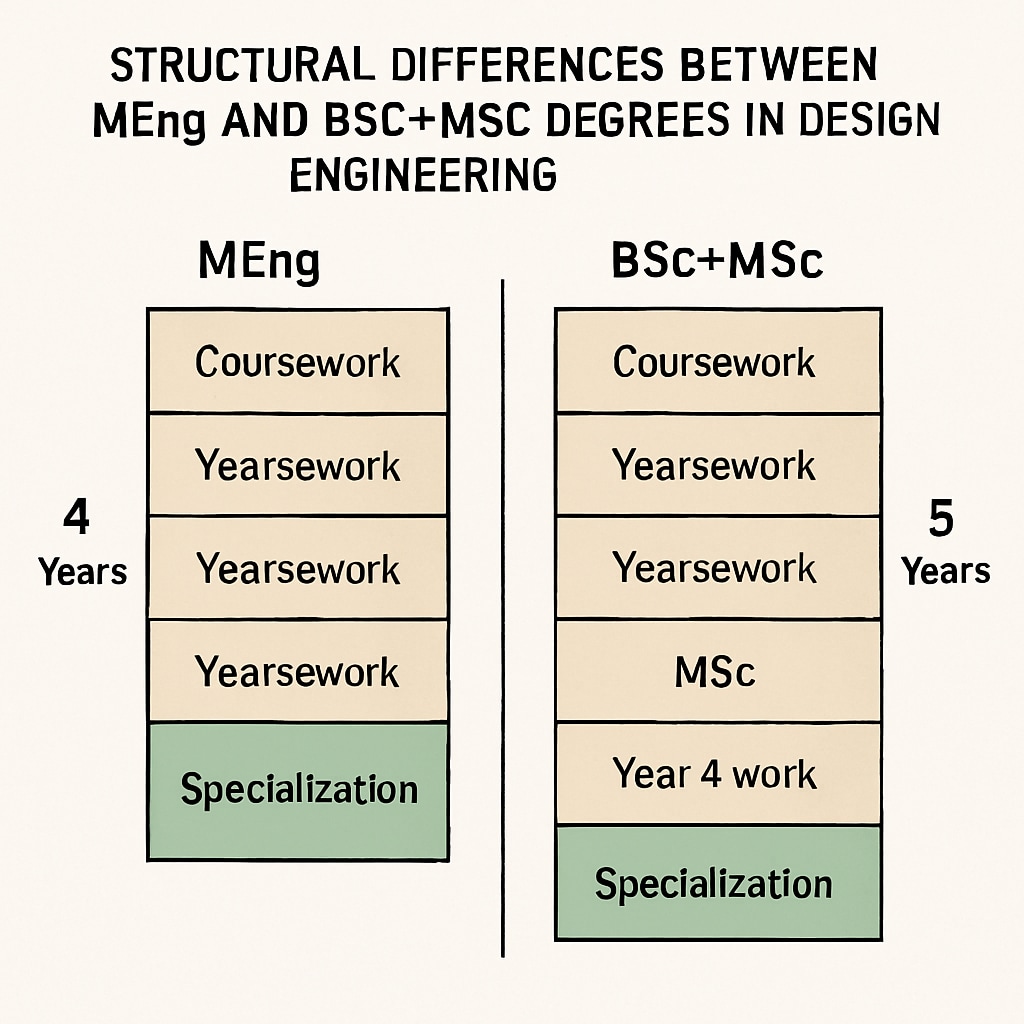When considering a career in design engineering, choosing the right academic path is critical. The decision between pursuing an integrated MEng degree or a BSc followed by an MSc can significantly influence your career prospects. This article aims to shed light on these options, helping students and parents navigate the complexities of educational planning in the field of design engineering while evaluating their long-term impact on career development.
Understanding the Design Engineering Degrees: MEng vs. BSc+MSc
Both the MEng (Master of Engineering) and the BSc+MSc (Bachelor of Science followed by a Master of Science) routes are popular choices in design engineering. However, they differ in structure, duration, and focus. The MEng is an integrated degree, typically spanning four years, where students transition seamlessly from undergraduate to postgraduate coursework. In contrast, the BSc+MSc pathway involves completing a standalone bachelor’s degree, often three years, followed by a separate master’s program that lasts one to two years.
The MEng is often favored by students seeking a streamlined experience, as it offers continuous learning without a break between undergraduate and postgraduate studies. On the other hand, the BSc+MSc route offers flexibility, allowing students to specialize in niche areas or even switch universities for their master’s degree. This flexibility can be advantageous for those who wish to tailor their education to specific career goals.

Key Factors to Consider When Choosing Your Path
When deciding between an MEng and a BSc+MSc, several factors should be taken into account:
- Career Goals: If you aspire to work in countries where an integrated master’s degree is highly valued (e.g., the UK), the MEng may provide an edge. Conversely, the BSc+MSc route may be better for those considering international opportunities or interdisciplinary studies.
- Cost: The BSc+MSc path may be more expensive, particularly if you choose to pursue your MSc at a prestigious institution. However, it allows for financial planning between degrees.
- Specialization: The BSc+MSc route offers greater flexibility for specialization. For instance, you could complete a BSc in Mechanical Engineering and then pursue an MSc in Sustainable Design, broadening your expertise.
- Time Commitment: The MEng typically takes four years, while the BSc+MSc can take five or more, depending on the duration of the master’s program.
By carefully evaluating these factors, you can select the pathway that aligns best with your academic interests and career aspirations.
Career Development: How Each Path Shapes Your Future
The impact of your degree choice on career development in design engineering is substantial. Employers often value the MEng for its cohesive approach and the depth of knowledge it provides. Graduates of MEng programs are frequently recruited for advanced design roles and leadership positions within engineering firms.
In contrast, the BSc+MSc route can offer a competitive advantage through specialization. For example, completing an MSc in a cutting-edge area like computational design or robotics can make you uniquely qualified for roles in emerging industries. Additionally, this route allows students to build a diverse academic network by studying at different institutions for their bachelor’s and master’s degrees.

Final Thoughts: Making an Informed Choice
Ultimately, the choice between an MEng and a BSc+MSc in design engineering depends on your personal goals, financial situation, and career aspirations. Both paths offer unique advantages, and neither is inherently superior. What matters most is aligning your educational journey with your long-term vision for professional success.
If you’re still undecided, consider consulting academic advisors, industry professionals, or alumni from your prospective programs. Their insights can provide valuable perspectives to guide your decision-making process. For further reading on engineering education, check out engineering on Britannica or engineering on Wikipedia.
Remember, your degree is the foundation of your career, but your dedication, adaptability, and continuous learning will ultimately define your success in the dynamic field of design engineering.


